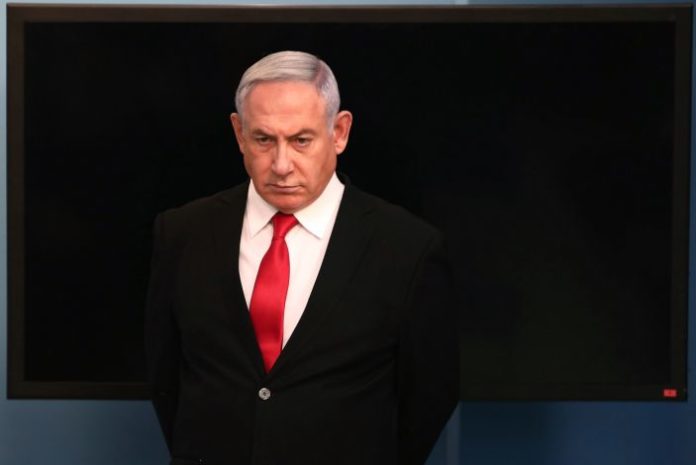Israel’s prime minister Saturday said he is ready to step down next year as part of a proposed power-sharing agreement with his chief rival meant to steer the country through the coronavirus crisis and end a year-long political deadlock.
Prime Minister Benjamin Netanyahu made his proposal during a nationally televised interview, calling for the formation of a three-year “emergency” unity government with the rival Blue and White Party.
Netanyahu told Channel 12 TV that he would remain as prime minister for the first year and a half, and allow Blue and White leader Benny Gantz to assume the post for a second year-and-a-half term in September 2021. He said each party would have an equal number of seats in the Cabinet.
“I will give up the prime minister’s post in another year and a half,” Netanyahu said.
Yair Lapid, a senior Blue and White leader, dismissed Netanyahu’s unity offer as insincere. “Next week, we will go to choose a new parliament speaker and work to battle coronavirus for the good of the people,” he said.
Israel is facing a growing threat from the coronavirus pandemic. It has detected nearly 900 cases and on Friday reported its first death. With the public largely confined to their homes, the economy appears to be in great danger, with tens of thousands of people losing their jobs.
Blue and White has accused Netanyahu of using the coronavirus crisis to undermine the country’s democratic institutions and try to derail his scheduled trial on corruption charges. Senior members of Gantz’ party have expressed skepticism at previous power-sharing overtures by Netanyahu, concerned that he would not follow through on his promises to cede power.
Israel this month held its third inconclusive election in under a year. Netanyahu’s Likud emerged as the largest single party, but fell short of securing a required parliamentary majority. A slim majority of lawmakers has endorsed Gantz as their choice for prime minister, though it is unclear whether he will be able to cobble together a governing coalition either.
Gantz now has just over three weeks to form a new government. In the meantime, he is trying to push through legislation in parliament that would in effect prevent Netanyahu from serving as prime minister in the future. The legislation would impose term limits on the prime minister and bar a politician indicted on criminal charges, like Netanyahu, from being prime minister.
Last week, parliament Speaker Yuli Edelstein, a member of Likud, suspended the parliament’s activities, preventing the newly elected legislature from choosing a new speaker and forming the committees needed to push through Blue and White’s legislative agenda.
Netanyahu’s hand-picked justice minister last week also shut down most of the court system, delaying the prime minister’s trial until at least May.
Netanyahu’s opponents have accused him and his surrogates of undermining the country’s democratic institutions. Blue and White planned to file a Supreme Court challenge on Sunday requiring parliament to resume its activities.
With the public ordered to stay at home, tens of thousands of people tuned in on social media late Saturday to a “virtual protest,” accusing Netanyahu of endangering the country’s democratic foundations. Former directors of the Mossad and Shin Bet security agencies were among the speakers.
“Benjamin Netanyahu, get yourself together and release us from being your hostages,” said Yuval Diskin, a former Shin Bet director. “Do it for the good of the country and the people.”
More than 275,000 people have been infected by the coronavirus worldwide. The virus has killed more than 11,000 people, while more than 88,000 have recovered.
Most people only experience minor flu-like symptoms from the coronavirus and recover within a few weeks, but the virus is highly contagious and can be spread by those who appear well. It can cause severe illness, including pneumonia, in some patients, particularly the elderly and those with underlying health problems.













